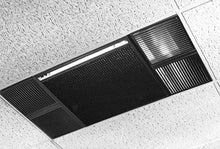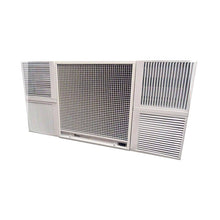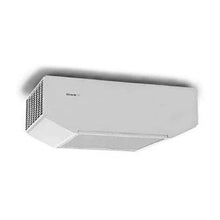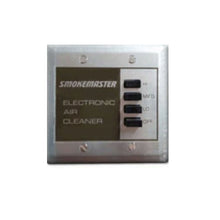Navigating Smoke-Filled Spaces: Portable vs. Fixed Air Purification Solutions

For businesses with designated smoking areas—from vibrant patios at a brewpub to cozy cigar lounges or even temporary pop-up events—managing air quality is a complex challenge. The persistent odor and harmful particulate matter from smoke can easily drift into non-smoking zones, creating an uncomfortable and unhealthy environment for both patrons and staff. Choosing the right air purification strategy is a critical decision that impacts not just customer comfort, but also your business's compliance and reputation. This is where the debate between portable commercial air purifiers and fixed air filtration systems comes to the forefront. At Commercial Air Purifiers, LLC, we understand these challenges, and we've put together this comprehensive guide to help you make an informed decision based on your specific needs. Our focus is always on providing effective, high-quality air purification that delivers real results.
The Invisible Threat: Understanding Smoke's Impact on Air Quality
Smoking areas, whether indoors or out, are a primary source of airborne contaminants. A single cigarette releases a complex mixture of over 7,000 chemicals, including hundreds that are toxic. The most critical components from an air quality perspective are fine particulate matter (PM2.5) and volatile organic compounds (VOCs). PM2.5 particles are microscopic—about 30 times smaller than the width of a human hair—and can be inhaled deep into the lungs, where they can enter the bloodstream. The U.S. Environmental Protection Agency (EPA) warns that exposure to PM2.5 can lead to a range of health issues, including respiratory and cardiovascular problems. A 2020 study published in the journal Science of The Total Environment further links exposure to secondhand smoke to increased risk of chronic obstructive pulmonary disease (COPD) and other respiratory ailments, underscoring the serious health implications for those who work or spend time in these areas.
Even with outdoor smoking patios, the problem of smoke drift is a real concern. Wind currents, HVAC systems, and foot traffic can all carry these harmful particles and odors into adjacent indoor spaces. This can lead to a host of complaints and a less than stellar customer experience. Businesses face the challenge of providing a comfortable space for smokers while also protecting the health of everyone else on the premises. The solution isn't just about moving the problem; it's about removing it.
When Flexibility is Key: The Case for Portable Commercial Air Purifiers
For many businesses, a one-size-fits-all solution simply doesn't work. This is especially true for dynamic spaces or establishments that need a more flexible smoke removal solution. This is where a portable commercial air purifier truly shines. A high-quality portable unit can be moved wherever and whenever it's needed, making it an ideal choice for a variety of scenarios. Think about a restaurant with a seasonal outdoor patio that only sees significant use in the warmer months, or a temporary smoking tent for a special event. Instead of a permanent installation that sits unused for half the year, a portable unit can be stored away and brought out only when necessary.
One of the biggest advantages of portable units is their immediate deployment. There's no complex installation, no need for extensive ductwork, and minimal disruption to your business operations. A quality portable unit, like those we stand by at Commercial Air Purifiers, LLC, comes equipped with robust multi-stage filtration—including a pre-filter, a high-efficiency HEPA filter, and a powerful carbon filter. The activated carbon filter is particularly effective at absorbing the thousands of different chemicals and odors found in smoke, preventing them from recirculating into the air. When evaluating a unit, it's crucial to look at its CFM (Cubic Feet per Minute) rating, which measures the volume of air it can process. To determine the right CFM for your space, we recommend using our online CFM calculator to ensure the unit is powerful enough for your needs.
A portable air purifier for a temporary smoking area provides a quick and effective fix without the long-term commitment of a fixed system. We've seen businesses use them to create a comfortable, clean-air "pocket" around specific tables or in high-traffic smoking corridors. The ability to deploy purification right where it's needed most is a powerful tool in managing air quality in a dynamic environment.
The Power of Permanence: Fixed Air Filtration Systems
For businesses with dedicated, permanent smoking areas, such as a cigar lounge or an enclosed smoking room at a hotel, a fixed air filtration system is often the more powerful and seamless solution. These systems are integrated directly into the building's HVAC infrastructure or installed as stand-alone units, providing continuous, consistent air purification. Unlike a portable unit that addresses a localized area, a fixed system is designed to treat the air for the entire space, ensuring a uniform level of air quality throughout.
A key benefit of a fixed system is its discreet operation and powerful performance. They are often installed in ceilings or walls, out of sight and out of the way, which is a major advantage for businesses that want to maintain a clean aesthetic. A well-designed fixed system will have a higher CFM rating than most portable units and can handle a larger volume of contaminants, making them ideal for high-occupancy or heavily used smoking areas. These systems also often include advanced features like air pressure sensors and automated controls, allowing them to adjust their performance in real-time based on the air quality.
The decision to install a fixed system is a long-term investment, but the benefits in terms of consistent performance and reduced maintenance can be significant. A 2022 review in the International Journal of Environmental Research and Public Health confirmed that high-efficiency particulate air (HEPA) filters are highly effective at removing smoke particles, and when integrated into a permanent system, can drastically improve indoor air quality. For a business where smoking is a core part of the experience, a fixed installation isn't just a solution; it's a fundamental part of the business infrastructure that protects the health and comfort of every person in the space.
Making the Right Choice: Factors to Consider
Deciding between a portable and fixed system requires a careful evaluation of your specific business needs. There is no single "best" option; the right choice is the one that aligns with your operational model and air quality goals. Here's a breakdown of the key factors to weigh:
-
Mobility vs. Permanence: If your smoking area is temporary, shifts locations, or is only used seasonally, a portable unit is the most logical choice. It provides the flexibility you need without the capital expenditure and disruption of a fixed installation. If you have a dedicated, permanent space, a fixed system will provide a higher level of continuous purification and seamless integration.
-
Size of the Space and Air Exchange Rate: The CFM of the unit is critical. Larger rooms require higher CFM. A fixed system can often handle a greater volume of air, making it more suitable for large, open spaces. For smaller, more contained areas, a powerful portable unit can be more than sufficient. You can use our CFM calculator to get an accurate estimate of what your space requires.
-
Initial Cost and Long-Term Maintenance: A fixed system has a higher upfront cost for both the equipment and professional installation. However, maintenance can be more efficient in the long run. Portable units are less expensive to purchase and have no installation costs, but you may need to move and maintain multiple units to cover a larger area, which can add up over time.
-
Aesthetics and Noise Level: Fixed systems are often less noticeable and can be quieter than their portable counterparts, as they are often installed in less conspicuous locations. However, a high-quality portable unit designed for commercial use should also have a low operational noise level that won't disrupt the atmosphere of your establishment.
At Commercial Air Purifiers, LLC, we pride ourselves on delivering solutions that are built to last. We focus on providing products made in North America that stand up to rigorous use, a commitment to quality that we believe is non-negotiable. We've seen the difference that a high-quality, reliable air purifier can make in a business, and we're committed to helping you find the right solution for your unique situation.
Conclusion: A Breath of Fresh Air for Your Business
Whether you choose a portable commercial air purifier for its flexibility or a fixed air filtration system for its permanence, the ultimate goal remains the same: to create a safer, more comfortable environment for your patrons and employees. The presence of smoke in a commercial space, whether through a designated area or as a lingering odor, can negatively impact health, comfort, and business reputation. By taking proactive steps to remove smoke from the air, you are not just investing in equipment; you are investing in a healthier atmosphere and a better customer experience. We are confident that by prioritizing air quality with a high-performance solution, you can create a space that is both welcoming to smokers and comfortable for everyone else.
Frequently Asked Questions
Q: How often do I need to replace the filters?
A: Filter life depends on usage and the level of contaminants in the air. For a smoking area, it will be more frequent. Typically, a pre-filter might need to be replaced every 1-3 months, while the HEPA and carbon filters may last 6-12 months. Regular checks are essential to maintain optimal performance.
Q: Can air purifiers completely eliminate the smell of smoke?
A: While no system can make a smoke-filled room smell like a spring meadow, a high-quality air purifier with a robust carbon filter can significantly reduce and often eliminate lingering smoke odors by absorbing the odor-causing chemicals.
Q: What is the difference between CFM and CADR?
A: CFM (Cubic Feet per Minute) measures the volume of air a unit moves, making it the most direct measure of a unit's power and its ability to treat a specific space. CADR (Clean Air Delivery Rate) measures the rate at which an air purifier removes certain particles (pollen, smoke, dust) from the air. For commercial applications, CFM is a more reliable metric because it directly relates to the air changes per hour (ACH) you need to achieve in your space.
By Commercial Air Purifiers, LLC





